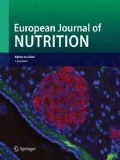Summary
Successful and responsible introduction of probiotic and prebiotic products into the worldwide marketplace requires labelling for health benefits that meets consumer needs, adheres to regulatory standards and does not overextend scientific evidence. Regulations differ among countries, but underlying all is an emphasis on scientific credibility of any statements of health benefits. This paper considers the value of different types of evidence offered in substantiation of efficacy and reviews different regulatory approaches to labelling for health claims. Limitations of in vitro, animal and different types of human studies used for efficacy substantiation for probiotics and prebiotics are discussed.
Similar content being viewed by others
References
Reid G, Sanders ME, Gaskins HR, Gibson GR, Mercenier A, Rastall R, Roberfroid M, Rowland I, Cherbut C, Klaenhammer TR (2003) New scientific paradigms for probiotics and prebiotics. J Clin Gastroenterol 37:105–118
Rautio M, Jousimies-Somer H, Kauma H, Pietarinen I, Saxelin M, Tynkkynen S, Koskela M (1999) Liver abscess due to a Lactobacillus rhamnosus strain indistinguishable from L rhamnosus strain GG. Clin Infect Dis 28:1159–1160
Kalliomaki M, Salminen S, Arvilommi H, Kero P, Koskinen P, Isolauri E (2001) Probiotics in primary prevention of atopic disease: a randomised placebo-controlled trial. Lancet 357:1076–1079
Gionchetti P, Rizzello F, Venturi A, Brigidi P, Matteuzzi D, Bazzocchi G, Poggioli G, Miglioli M, Campieri M (2000) Oral bacteriotherapy as maintenance treatment in patients with chronic pouchitis: a double-blind, placebo-controlled trial. Gastroenterology 119:305–309
Van Niel CW, Feudtner C, Garrison MM, Christakis DA (2002) Lactobacillus therapy for acute infectious diarrhea in children: a meta-analysis. Pediatrics 109:678–684
Brighenti F, Casiraghi MC, Canzi E, Ferrari A (1999) Effect of consumption of a ready-to-eat breakfast cereal containing inulin on the intestinal milieu and blood lipids in healthy male volunteers. Eur J Clin Nutr 53:726–733
Rafter JJ (2002) Scientific basis of biomarkers and benefits of functional foods for reduction of disease risk: Cancer. Br J Nutr 88:S219–S224
Oli MW, Petschow BW, Buddington RK (1998) Evaluation of fructooligosaccharide supplementation of oral electrolyte solutions for treatment of diarrhea. Recovery of the intestinal bacteria. Dig Dis Sci 43:138–147
Author information
Authors and Affiliations
Corresponding author
Rights and permissions
About this article
Cite this article
Sanders, M.E., Tompkins, T., Heimbach, J.T. et al. Weight of evidence needed to substantiate a health effect for probiotics and prebiotics. Eur J Nutr 44, 303–310 (2005). https://doi.org/10.1007/s00394-004-0527-6
Received:
Accepted:
Published:
Issue Date:
DOI: https://doi.org/10.1007/s00394-004-0527-6




